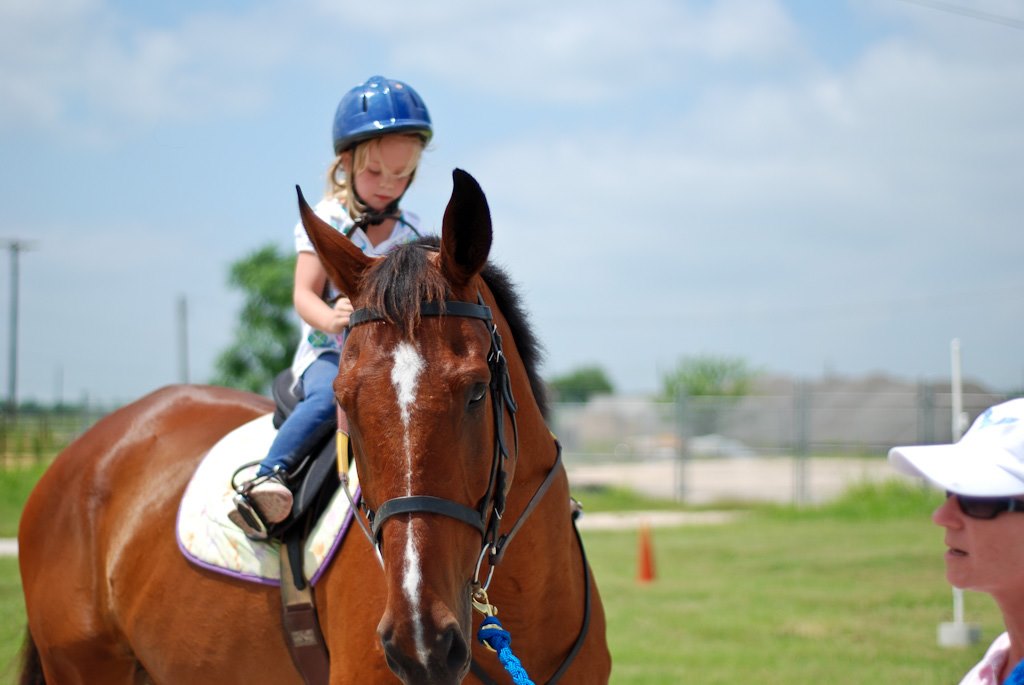How I found hidden teachers

I once rode at a barn with a varied (and wonderful) clientele. Every kind of horse seemed to be there. Dressage, team roping, hunter/jumper, polo — and even a few endurance mounts.
The riders were from equally varied backgrounds — from weekend trail riders to upper level competitors. I enjoyed the mix. Everyone loved their horses and wanted only the best for them.
I often saw certain people frequently there. Our schedules overlapped. The adorable pre-teen with her first ever horse (a mellow senior citizen paint). The retired military man with the Belgian draft cross. And then there was Ginger (not her real name) — a vivacious and outgoing real estate agent. Ginger owned a kindhearted Andalusian mare. They were both learning how to do working equitation (and garrocha pole wielding).
Ginger was an incredibly successful entrepreneur and investor. She had parlayed her real estate career into an empire. Plus she had grown her hobby of collecting vintage kitchen utensils into a lucrative side hustle. As in a six-figure business that she did almost casually, in between selling elegant lofts to deca-millionaires.
I really liked Ginger. She was funny and down-to-earth. And she adored her mare (Petunia), lavishing her with color-coordinated gear. Petunia’s entire wardrobe was fuchsia (with an occasional lime green accent).
And I admired Ginger’s business acumen and success. Here was someone I could learn from. My own business sense is fairly limited. I worked for nonprofits for most of my employment history. As a result, I tend to see myself as a novice when it comes to commercial enterprises. How cool would it be to hang around someone like Ginger and learn how to think differently about business?
There was just one problem. I couldn’t hear Ginger. Oh, I tried to ask her about her work and how she got started with real estate (and vintage spoon cartels). Or to solicit her opinion on major business trends.
Ginger would answer my questions readily, happily sharing her perspectives. But I couldn’t understand a thing she said (at least not for very long). Why?
Well, Ginger had an unfortunate (to me) syntax issue. She liked to use baby talk. Like all the time. And when she did baby talk, she also pitched her voice way up high — and then sometimes dropped it down to a whisper. Before trailing the remanent of her sentence into a breathless giggle.
This was a tough one for me.
It was like I was deaf around her. As soon as I heard the baby talk, my brain disconnected immediately. She could be telling me the sharpest, most astute business advice ever — and I couldn’t hear a word. Ginger was smart, sophisticated, wildly successful financially — and she sounded like a cocaine-infused toddler who had just been handed candy.
I tried to overcome my prejudice — but eventually gave up. It was just too hard to hear the words under the baby talk. My head (and ears) would start to hurt — and I’d hastily exit the scene, leaving Ginger to babble on alone.
Does this mean that Ginger never said anything valuable? Not at all. She truly was an intelligent and capable entrepreneur. I’m sure I missed many words of wisdom. Was I a bad or judgmental person for not being able to hear past the baby talk? Probably not. I mean, some people can’t take the sound of fingernails on a chalkboard (not that we use those anymore). I just can’t take the sound of baby talk. Unless it’s an actual baby doing it.
So what does this long story have to do with horsemanship?
Sometimes a good teacher will tell you something — and you won’t be able to hear it because it sounds like Ginger to you. Not that the teacher is actually using baby talk (that would be weird) — but that there is something in their presentation or style that distracts you from the information.
Most of the time, it isn’t the teacher’s fault either. It has more to with our own individual filters, as students and as people. For example, many years ago I had a job as a bookkeeper for a housing development. Their primary office was located onsite at a family farm converted into a gated luxury development. The centerpiece of the neighborhood was a riding facility, complete with covered arena and a glamorous dressage instructor named Britta (from Germany, of course).
Britta was tall, elegant and utterly fierce. She would stride around the arena, in flawlessly sleek breeches, shouting instructions in her German accent. Her students were simultaneously cowed and impressed — as were the horses she rode for them. An excellent rider, she always made horses look and move better (often to their surprise).
One day, she came into the office to pick up her paycheck. As I walked by her in the hallway, she stopped me and bellowed, “YOU!” I stopped, confused and slightly nervous. “You have the PERFECT build for dressage.” Britta inspected me, staring at my legs and shoulders. “You MUST ride with me!”
It didn’t quite feel like a compliment. I scurried away, throwing a quick thanks over my shoulder. “WHEN? When will you come for a lesson?” Britta’s voice followed me down the hallway. I mumbled an excuse, and retreated behind my office door. Over the next few weeks, Britta would casually stalk me on the grounds — always barking at me, analyzing my physique and demanding that I book a lesson.
I never rode with Britta. And I harbored a bias against German female dressage instructors for long afterward. It wasn’t that she terrified me so much as I resented the constant description of my build. To me, she seemed overbearing and a bit obsessed with my weight.
But here’s the thing. Britta was a good teacher. And she was a lovely rider. I could have learned much from her. If I could have just set aside what turned out to be fairly minor quirks in her demeanor. Now, years later, I see her from a different perspective. The best teachers want good students, ones with aptitude and studious characters. Britta knew I didn’t have lots of money (I was a bookkeeper, not a wealthy client) — but she thought I could excel in the sport she loved, because of my athletic potential and possibly what she saw as my steady nature (bookkeeper).
But I couldn’t get past her initial presentation. Baby talk and bellowing commands in German accents — these don’t work for me. German baby talk would probably be my worst case scenario.
We all do this. Some riders love a stern taskmaster (male or female) with a European accent. Others respond immediately to a taciturn cowboy clinician. Another group prefers their teachers to be down-to-earth women, with kindly maternal vibes. Still others want sporty eventing warriors or charismatic barrel racers full of bling and bravado.
The point is — don’t worry about what works for you. Just find the best teachers you can — the ones who you can hear. And don’t obsess over why someone else likes a teacher you can’t hear. Many students learned from Britta — and that reflected well on her, rather than poorly on them.
I have been reading Blink, by Malcolm Gladwell. He discusses how our instant first impressions (our “blinks”) can often be wrong. But we can work around that, if we choose — by setting up ways to neutralize our initial rapid-fire perceptions. By removing bias, we can focus on inherent value more quickly.
In my case, what that means is that I could have started a texting or messaging conversation with Ginger. So I could see her advice and business insights in the written form (rather than through the sound of baby talk). Or for Britta, I could have watched how her students and horses improved (but while wearing AirPods, so I didn’t have to hear her bellows).
Training my mind in this way has many benefits. It keeps me curious and open. And I often learn many new things from people I had dismissed. That keeps me humble and grateful — as well as increases my sense of humor about myself. Curiosity, adaptability, humility, gratitude and a sense of humor — these are the best things to cultivate in horsemanship.
Many thanks to Ginger and Britta. They taught me well, even if it took me years to realize it.

